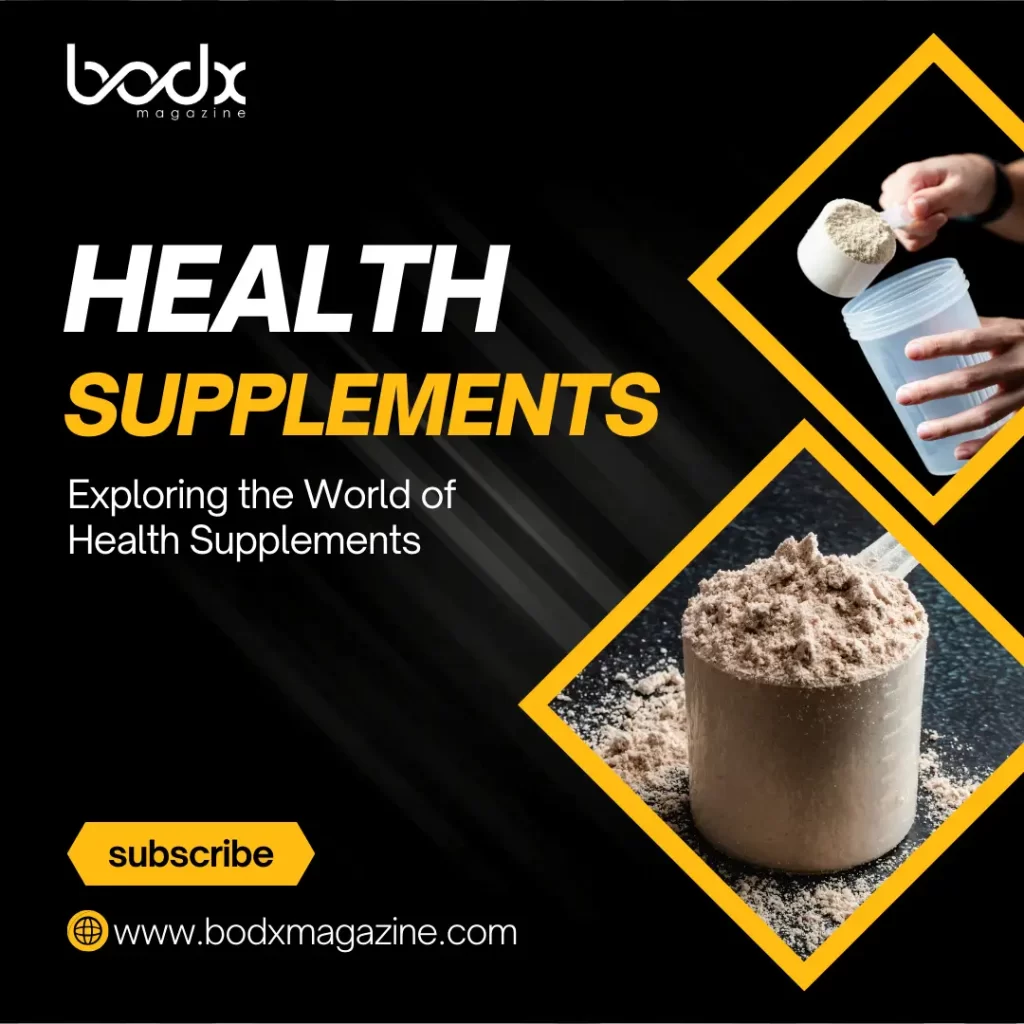Introduction
Exploring the World of Health Supplements
In the ever-evolving landscape of health and wellness, new health supplements emerge frequently, promising various benefits. From boosting immune function to enhancing mental clarity, these supplements aim to address diverse health concerns. However, with the market saturated with numerous options, it’s crucial to understand their efficacy and safety. This article delves into detailed evaluations of new health supplements, providing insights to help you make informed decisions.
Understanding Health Supplements
What Are Health Supplements?
Health supplements are products designed to augment your diet and provide nutrients that may be lacking. They come in various forms, including capsules, tablets, powders, and liquids. These supplements often contain vitamins, minerals, herbs, amino acids, and enzymes.
The Role of Health Supplements in Modern Wellness
In today’s fast-paced world, maintaining optimal nutrition through diet alone can be challenging. Health supplements fill nutritional gaps, support specific health goals, and enhance overall well-being. They cater to various needs, from addressing deficiencies to boosting energy levels.
Evaluating New Health Supplements
Criteria for Evaluation
To evaluate new health supplements effectively, we consider several key criteria:
- Ingredients: Quality, source, and dosage of active ingredients.
- Efficacy: Scientific evidence supporting the supplement’s benefits.
- Safety: Potential side effects and interactions with medications.
- Manufacturing Standards: Compliance with Good Manufacturing Practices (GMP).
- Customer Reviews: Feedback from users regarding effectiveness and tolerability.
The Importance of Scientific Evidence

Scientific evidence is paramount when assessing health supplements. Peer-reviewed studies, clinical trials, and meta-analyses provide valuable insights into the efficacy and safety of these products. Reliable supplements often have robust scientific backing.
Top New Health Supplements in 2024
1. Ashwagandha Extract
Overview
Ashwagandha, an adaptogenic herb, has gained popularity for its stress-relieving properties. It’s used in Ayurvedic medicine to enhance vitality and resilience.
Benefits and Efficacy
Studies indicate that Ashwagandha can reduce cortisol levels, improve stress resilience, and enhance cognitive function. It also shows promise in supporting physical performance and muscle strength.
Safety and Dosage
Ashwagandha is generally well-tolerated. The typical dosage ranges from 300-600 mg of standardized extract per day. However, pregnant women and individuals with autoimmune conditions should consult a healthcare provider before use.
2. CBD Oil
Overview
Cannabidiol (CBD) oil, derived from the hemp plant, is celebrated for its potential therapeutic benefits. It does not produce the psychoactive effects associated with THC.
Benefits and Efficacy
CBD oil may help with anxiety, pain relief, and sleep disorders. Research also suggests anti-inflammatory and neuroprotective properties. Its efficacy varies based on the condition being treated and the dosage used.
Safety and Dosage
CBD is considered safe, but it can interact with certain medications. Starting with a low dose (e.g., 20 mg per day) and gradually increasing is recommended. Consulting a healthcare provider ensures safe and effective use.
3. Collagen Peptides
Overview
Collagen peptides, derived from animal or marine sources, are known for their skin, joint, and bone health benefits. They are easily digestible and absorbed by the body.
Benefits and Efficacy
Collagen supplementation supports skin elasticity, reduces wrinkles, and promotes joint health. Studies show that daily intake of 2.5-10 grams of collagen peptides can improve skin hydration and reduce joint pain.
Safety and Dosage
Collagen peptides are safe for most individuals. The typical dosage ranges from 5-10 grams per day. Ensure the product is sourced from high-quality, reputable manufacturers.
4. Probiotics
Overview
Probiotics are live microorganisms that confer health benefits when consumed in adequate amounts. They are commonly found in fermented foods and supplements.
Benefits and Efficacy
Probiotics support gut health, enhance immune function, and may alleviate symptoms of irritable bowel syndrome (IBS). Specific strains like Lactobacillus and Bifidobacterium are well-researched for their health benefits.
Safety and Dosage
Probiotics are generally safe, with a typical dosage ranging from 1-10 billion CFUs (colony-forming units) per day. Individuals with compromised immune systems should consult a healthcare provider before use.
5. Omega-3 Fish Oil
Overview
Omega-3 fish oil, rich in EPA and DHA, is known for its cardiovascular and cognitive health benefits. It is derived from fatty fish like salmon and mackerel.
Benefits and Efficacy
Omega-3 fish oil supports heart health, reduces inflammation, and promotes brain function. Studies recommend a daily intake of 250-500 mg of combined EPA and DHA for general health.
Safety and Dosage
Fish oil is safe for most individuals. However, high doses can increase bleeding risk. The recommended dosage varies, but 1-3 grams per day is common. Choosing a high-quality, purified product minimizes contaminants like mercury.
6. Turmeric Curcumin
Overview
Turmeric, a spice containing curcumin, is renowned for its anti-inflammatory and antioxidant properties. It’s used traditionally in Ayurvedic and Chinese medicine.
Benefits and Efficacy
Curcumin can reduce inflammation, alleviate joint pain, and support digestive health. Enhanced bioavailability formulations like curcumin with black pepper extract (piperine) improve absorption.
Safety and Dosage
Curcumin is safe but may cause digestive discomfort in high doses. A typical dosage is 500-2,000 mg of curcumin extract per day, standardized to contain 95% curcuminoids.
7. Vitamin D3
Overview
Vitamin D3, the active form of vitamin D, is crucial for bone health, immune function, and mood regulation. It’s synthesized in the skin upon sun exposure and available in supplements.
Benefits and Efficacy
Vitamin D3 supports calcium absorption, bone density, and immune response. It may also improve mood and reduce the risk of certain chronic diseases. Optimal blood levels range from 30-50 ng/mL.
Safety and Dosage
Vitamin D3 is safe when taken within recommended limits. The typical dosage is 1,000-4,000 IU per day, depending on individual needs and blood levels. Over-supplementation can cause toxicity, so monitoring levels is important.
8. Magnesium Glycinate
Overview
Magnesium glycinate is a highly absorbable form of magnesium, essential for muscle function, nerve health, and energy production. It’s often used to address magnesium deficiency.
Benefits and Efficacy
Magnesium glycinate can improve sleep quality, reduce muscle cramps, and support mental health. It’s less likely to cause digestive upset compared to other forms of magnesium.
Safety and Dosage
Magnesium glycinate is safe for most individuals, with a typical dosage of 200-400 mg per day. High doses may cause diarrhea and other gastrointestinal issues.
9. Green Tea Extract
Overview
Green tea extract, rich in antioxidants like EGCG (epigallocatechin gallate), is known for its potential health benefits, including weight management and heart health.
Benefits and Efficacy
Green tea extract can enhance metabolism, support cardiovascular health, and provide antioxidant protection. Studies suggest a daily intake of 250-500 mg of standardized extract.
Safety and Dosage
Green tea extract is safe for most individuals, but excessive intake can lead to caffeine-related side effects. The typical dosage is 250-500 mg per day, standardized to contain 50% EGCG.
10. Coenzyme Q10 (CoQ10)
Overview
Coenzyme Q10 (CoQ10) is a powerful antioxidant that supports cellular energy production and cardiovascular health. It’s naturally produced in the body and available in supplement form.
Benefits and Efficacy
CoQ10 supplementation can improve energy levels, reduce oxidative stress, and support heart function. It’s particularly beneficial for individuals on statin medications, which can deplete CoQ10 levels.
Safety and Dosage
CoQ10 is safe, with a typical dosage of 100-300 mg per day. Higher doses may be necessary for specific health conditions. CoQ10 is best absorbed with food, particularly fats.
How to Choose the Right Health Supplement
Assessing Your Health Needs
Before selecting a health supplement, assess your health needs and goals. Consider factors like diet, lifestyle, and specific health concerns. Consulting a healthcare provider ensures personalized and safe recommendations.
Researching Supplement Brands
Research supplement brands for quality, transparency, and manufacturing standards. Look for third-party testing, GMP certification, and positive customer reviews.
Reading Labels and Ingredients
Reading labels and ingredients is crucial for understanding what’s in the supplement. Check for active ingredients, dosages, and potential allergens or fillers. Opt for products with clear, transparent labeling.
Potential Risks and Side Effects
Common Side Effects
While health supplements are generally safe, they can cause side effects. Common side effects include digestive issues, allergic reactions, and interactions with medications. Monitoring your body’s response is essential.
Interactions with Medications
Certain supplements can interact with medications, affecting their efficacy or causing adverse reactions. Always consult a healthcare provider before starting a new supplement, especially if you’re on medication.
Over-supplementation Dangers
Over-supplementation can lead to toxicity and adverse health effects. Stick to recommended dosages and avoid taking multiple supplements with overlapping ingredients.
Conclusion
Navigating the world of new health supplements requires careful consideration and informed decisions. By evaluating supplements based on ingredients, efficacy, safety, and scientific evidence, we can choose products that genuinely support our health and well-being. Remember to consult healthcare providers, research brands, and monitor your body’s response to ensure safe and effective supplementation. Embracing a holistic approach to health, including a balanced diet and lifestyle, further enhances the benefits of health supplements.
FAQs
1. Are health supplements necessary for everyone?
Not everyone needs health supplements. They are beneficial for filling nutritional gaps and addressing specific health concerns. It’s best to consult a healthcare provider.
2. Can I take multiple supplements at once?
Yes, but be cautious of potential interactions and overlapping ingredients. Consult a healthcare provider to ensure safe and effective combinations.
3. How long does it take to see results from health supplements?
The time to see results varies by supplement and individual. Some may notice benefits within weeks, while others may take months. Consistency is key.
4. Are natural supplements safer than synthetic ones?
Natural supplements are not inherently safer than synthetic ones. Both types can be effective and safe if sourced and manufactured properly. Quality matters more than origin.
5. Can health supplements replace a balanced diet?
No, supplements should complement, not replace, a balanced diet. Whole foods provide a range of nutrients and benefits that supplements alone can’t match.
6. How do I know if a supplement is high-quality?
Look for third-party testing, GMP certification, and transparent labeling. Research the brand’s reputation and customer reviews for additional assurance.
7. Are there any supplements that should be avoided?
Some supplements may be harmful or ineffective. Research and consult a healthcare provider before taking any new supplement, especially those with bold claims.
8. What is the best time to take health supplements?
The best time varies by supplement. Some are better taken with meals, while others may be more effective on an empty stomach. Follow the manufacturer’s recommendations.
9. Can children take health supplements?
Children may need supplements in certain cases, but dosages and safety vary. Consult a pediatrician before giving supplements to children.
10. How can I report adverse reactions to supplements?
Report adverse reactions to your healthcare provider and the supplement manufacturer. You can also report to regulatory agencies like the FDA for further investigation.

















